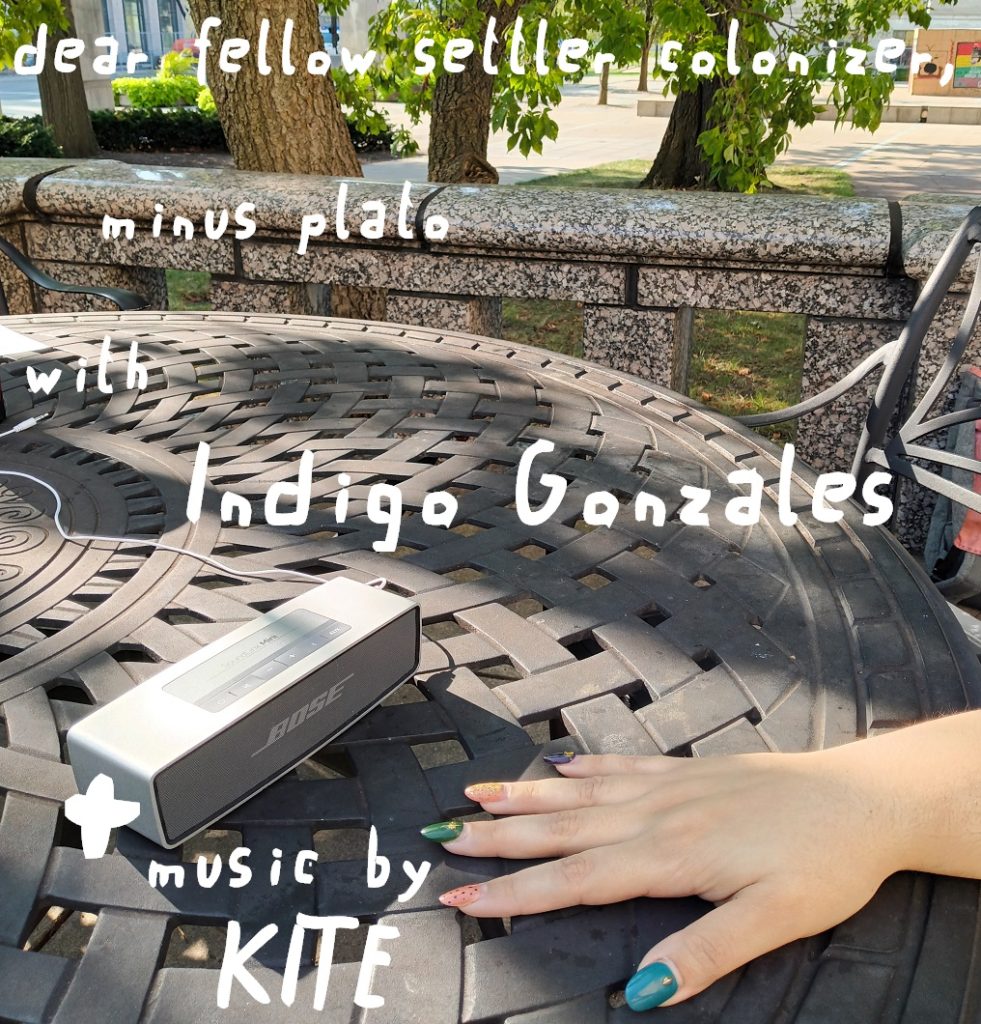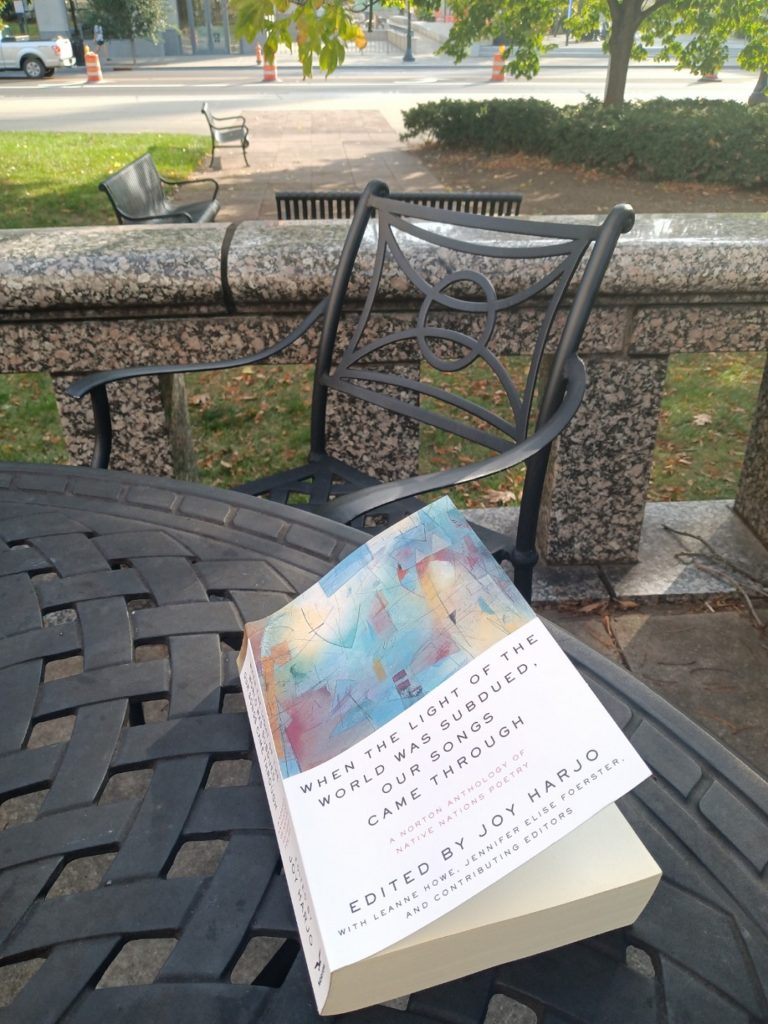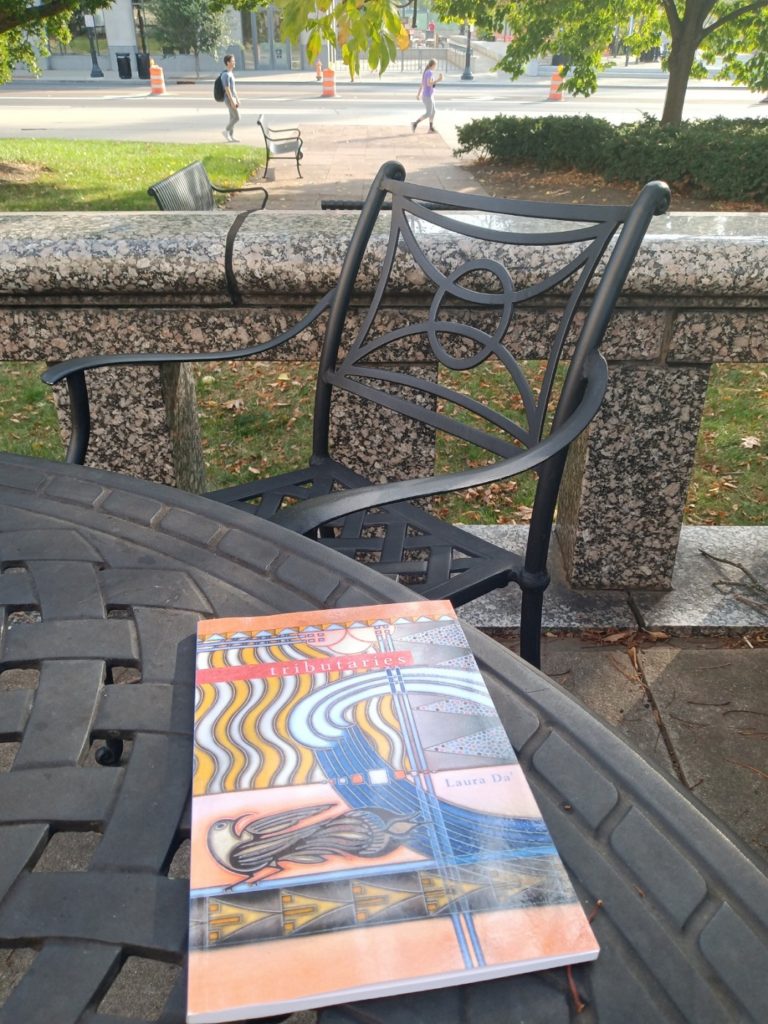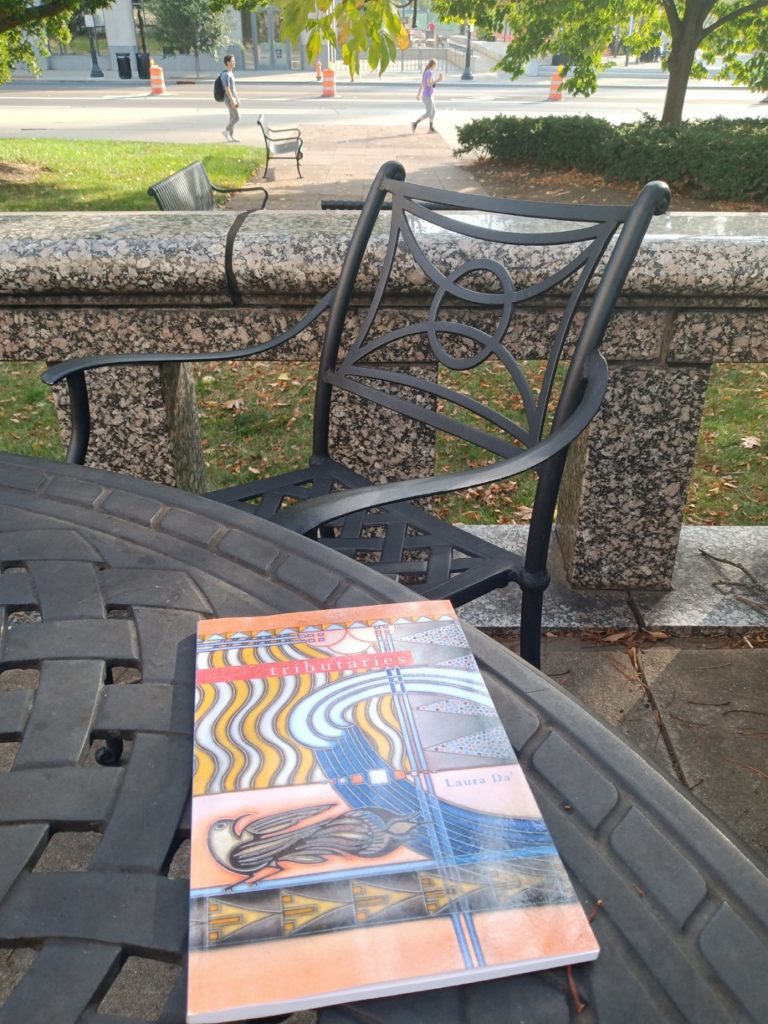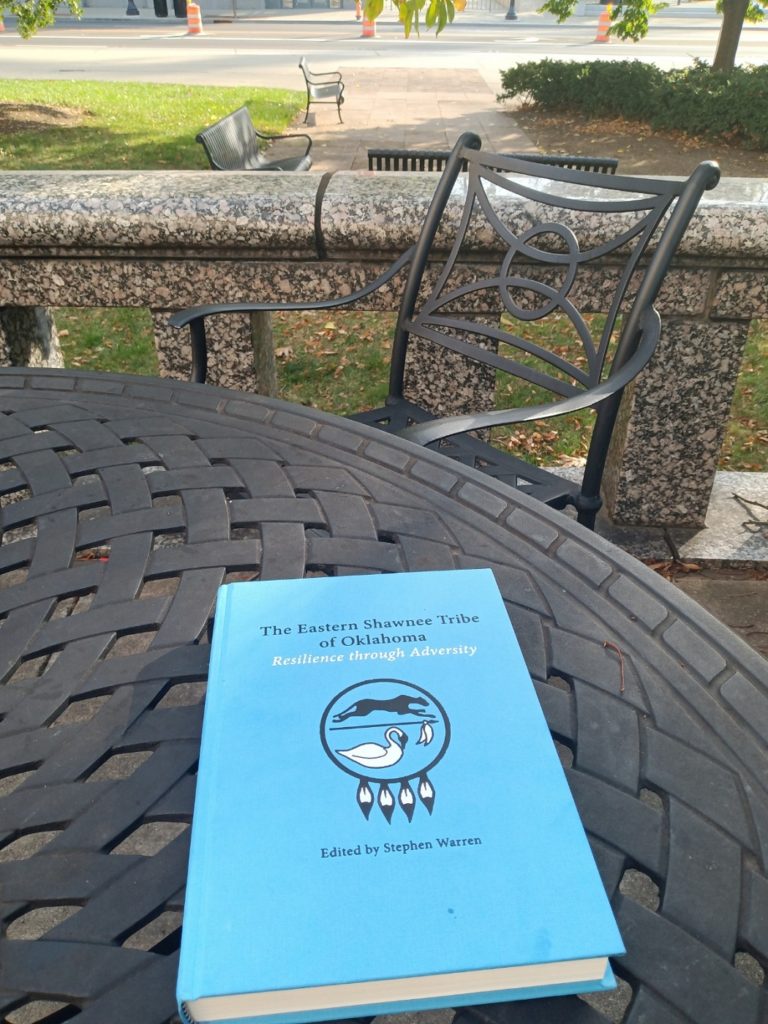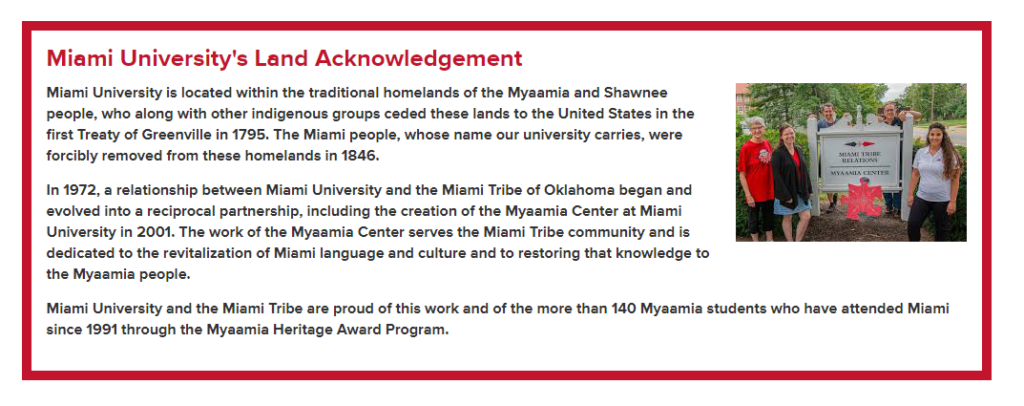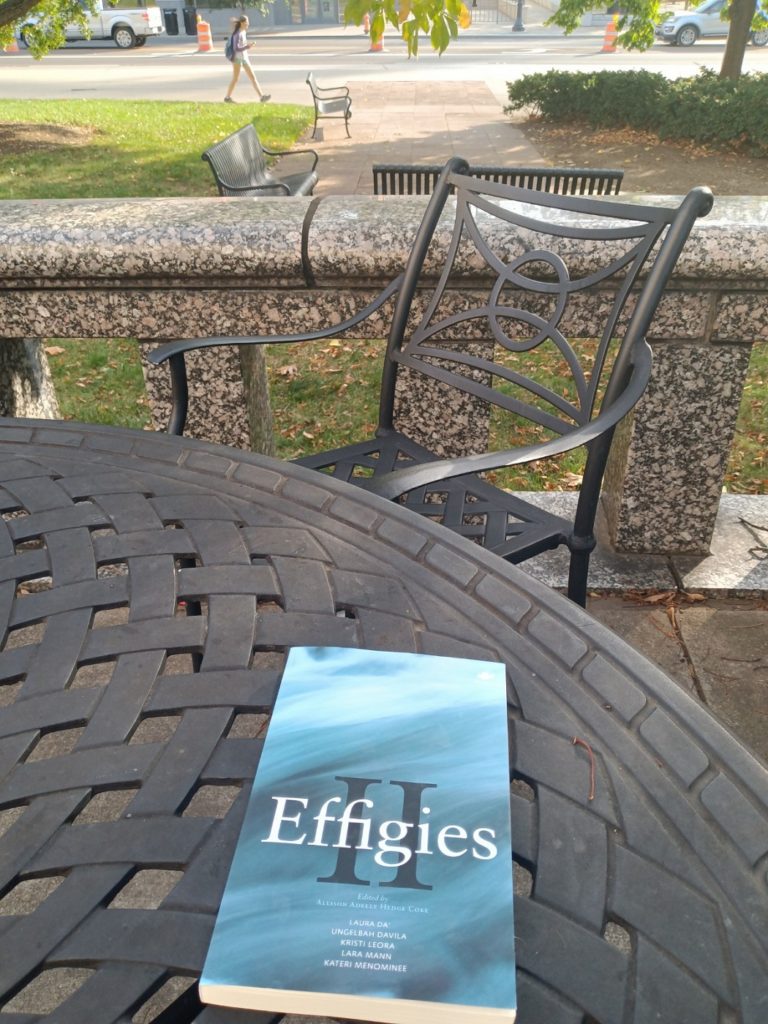Dear Laura,
I know we don’t know each other and I appreciate that sending this open letter in the form of a blogpost may not be the best way to connect for the first time. However, let me try to explain why I wanted to contact you in this way today – October 11th, Indigenous Peoples’ Day 2021 – of all days.
I am writing to you today from your ancestral lands here in Ohio. I am sitting outside the Wexner Center for the Arts on the Ohio State University campus at a metal table that looks out onto the busy traffic of High Street/US 23. This place is of some significance to me, not least because it is here that I have regular meetings with Indigo Gonzales, a local Afro-Indigenous artist, who I have had the honor of working with on several collaborations, including the monthly radio show dear fellow settler colonizer, for the local community online radio station Verge.Fm (below is an image promoting our last conversation, accompanied by the music of Suzanne Kite. In fact, after I have finished writing this to you, I need to work on editing the recording of our upcoming episode, set to be aired this Friday October 15th at 2pm EST, about Indigo’s participation in the project Potu faitautusi at Columbus Printed Arts Center).
Back to the here and now. If you head south on this road running next to where I am sitting writing this, which dissects the state of Ohio, it leads from Columbus to Chillicothe, almost following the course of the Scioto River. My family (my partner, Rebeka, and our son, Eneko) travel this route many times as we often go on holiday in or around Chillicothe, hiking and visiting the earthworks, such as (so-called) Seip Mound.
The last few times we have made this short, hour long trip south, I have brought with me books of your poetry: your chapbook The Tecumseh Motel, included in the anthology Effigies II, edited by Allison Adelle Hedge Coke in 2014, tributaries and Instruments of the True Measure, both published in the Sun Tracks series by Arizona University Press in 2015 and 2018 respectively.
I first came across your work in Joy Harjo, Leanne Howe and Jennifer Elise Foerster’s 2020 anthology When the Light of the World Was Subdued, Our Songs Came Through: A Norton Anthology of Native Nations Poetry.
Two of your poems (‘Nationhood’ and ‘Measuring the Distance to Oklahoma’) were included in the first section of the book on the Northeast and Midwest. In her introduction to this section called ‘Writing a Poetry of Continuance’, contributing editor Kimberly M. Blaeser writes:
Da’ addresses the literal erasure of Native knowledge, identity, and sovereignty through such things as the rampant renaming and remapping of tribal homelands.
These two poems stopped me in my tracks, especially how the opening, matter-of-fact line of ‘Nationhood’ (“I am a citizen of two nations: Shawnee and American. I have one son who is a citizen of three.”) explodes into the transformation of frontier, past and present, bodily and geographically, at the very heart of your poetry:
Before he was born, I learned that, like all infants, he would need to experience a change of heart at birth in order to survive. When a baby successfully breathes in through the lungs, the heart changes from parallel flow to serial flow and the shunt between the right and left atriums closes. Our new bodies obliterate old frontiers.
I flew from these two poems to your three books, each of which told me more about where I lived than any visit to the Ohio History Connection ever could. Whenever the Shawnee are named in institutional Land Acknowledgments, I think of your poetry; whenever Indigenous people are referred to in the past tense, I think of your poetry; whenever we park the car in front of Seip Mound – the name of which always sticks in my throat -, I think of your poetry; in the classes I teach at Ohio State (I am in the department of Arts Administration, Education and Policy), I think of your poetry.
The latter happened most recently when, in the class I am currently teaching called Global Indigenous Arts: Education for Settlers, I asked the students – several , but not all, of whom were from Ohio – where they had encountered Indigenous peoples, cultures and histories in their education before this point, and one student mentioned Tecumseh. I couldn’t resist paraphrasing the title poem of your The Tecumseh Motel (also included in opening section of tributaries called ‘The Always Frontier’), in which you describe the experience of being honored as guests as you and other members of the Eastern Shawnee Tribe of Oklahoma attended a performance of the outdoor theater Tecumseh Drama performed at Sugarloaf Mountain Amphitheatre in Chillicothe.
As much as I recalled for my students your reaction to how this ongoing shameless display of red-face pandered to the worst stereotypes, I focused on your descriptions of the stage effects used to recreate historical violence – the egg and cherry Kool-Aid to approximate scalping, the corn syrup, liquid soap, and red food dye to approximate death by gauntlet. Reading back over the poem here – as the sirens of a fire engine drone past – I am struck by your use of the word ‘approximate’. There you and your fellow representatives of your tribe sat, so close by to the fakeness of the Shawnee history as performed by good intentioned white settler ‘move to innocence’, your proximity never reaching to the hearts of the performers or the audience that they should simply stop acting and listen to you tell your peoples’ history and stories.
It is a similar feeling today on Indigenous Peoples’ Day when social media and university events engulf us settlers with a moment (the briefest of moments, a day) to reflect on our bloody history of colonial violence that ‘founded’ this nation, to which I, like so many British people before me, arrived and settled in 2006. At the same time, as with all things passed, tomorrow we settlers wake up and go about our daily extractions regardless of the simple fact that you are and all Indigenous people are still here.
I have so much to ask you about your poetry and about the lyric ‘I’ of your poetry, that this letter can only be a start, the beginning of a possible conversation, one in which what I write now will need to be revised thanks to what you are willing to share. I used to be a classicist, working on the literature and philosophy of ancient Greeks and Romans, but the presence of contemporary artists turned me from this dialogue with the dead to the irresistible force of living creativity. Not to say that your poetry doesn’t also dialogue with the dead. I read somewhere that the character of Lazarus Shale who walks and lives across the pages of all of your books was in fact your great-great-grandfather. Is that true? Or at least a poetic fiction that gropes towards some form of truth about your ancestors? Either way, I couldn’t get Lazarus out of my head when I read the last section of ‘Past Tense’, from Instruments of the True Measure:
I have an ancestor who, in the aftermath of the Civil War’s upheavals, made an appeal to Congress in support of the Shawnee tribe. I am told he was articulate, intelligent, and literate in Shawnee, English, and Latin. He was sent to Washington to advocate for the tribe in a famine winter. He spent months there, a dark shadow in the elegant Shawnee turban and clothes of his time, relegated to the chilly corners of the antechambers of antechambers.
A man of his generation would have been removed from Ohio alongside his parents and siblings in his boyhood. He would have been removed again with his own grandchildren. By the end of his life, he would have seen his nation reduced to a tenth.
Family legend claims that he waited in the capital for a season and a half, but was met with no audience.
How can it be that here in Ohio you too are met with no audience today? I could not find your books in any bookstore here, nor your words memorialized on any monument. I even searched through the pages of the rich and nuanced volume The Eastern Shawnee Tribe of Oklahoma: Resilience through Adversity, edited by Stephen Warren and published by the University of Oklahoma Press in 2017 and hoped to see your words or name appear, especially in Part III of the book called ‘Becoming Our Own Storytellers’, alongside the words of Elise Mae “Sis” Captain Hoevet, introduced and transcribed by your Chief Glenna J. Wallace, or those of Second Chief of the Shawnee Tribe, Benjamin J. Barnes, whose essay on tribal nations engaging with academia really hit home for me. But you were not here either.
Just across the High Street/US 23 from where I sit, there is a new art installation (although the artist here too seems to go unnamed) that comprises the word for ‘friendship’ in many different languages. I have yet to see if ‘friendship’ is there in Shawnee. Back to ‘Past Tense’, you begin the poem by referencing the Shawnee language in a way that now on reflection makes sense of why someone may have conflated Lazarus Shale with your great-grandfather:
The last Shawnee speaker in my family was my great-grandfather. Shipped away to boarding school as a young child, his language slipped from story to sentence, sentence to fragment, fragment to adjective, leaving him with the sparsest scattering of nouns to pass down – a starvation harvest of syntax-starved images.
I know the words for elk and water. There are other Shawnee nouns as dense as koans with metaphor and meaning, but they remain inscrutable to me.
Your poem makes me think of curriculum. I have just returned from a conference in Dayton, Ohio on Curriculum Theorizing and before introducing the final keynote speaker on Saturday night, professor Tom S. Poetter of Miami University recited the Miami University Land Acknowledgment:
In addition to this Land Acknowledgment as a statement of action and commitment, Poetter also celebrated the work of the Myaamia Center’s director, Daryl Baldwin, who in 2016 received a MacArthur “genius grant” for his work language revitalization.
This moment of acknowledgment and celebration at a conference when so much of our focus was on resisting right-wing fearmongering attacks here in Ohio, as well as in Oklahoma, Florida and Texas, on education and curriculum, superficially through a caricature of Critical Race Theory, took me back once again to your poetry, and specifically the the appearance of textbooks in the poem that opens your chapbook The Tecumseh Motel (and also included in tributaries): ‘Raven Talks Curriculum’. The poem opens as follows:
Raven curls his talons
against the newspaper rag
of a seventh grade textbook
that attributes his myth
to an anthropologist
who traveled along the Pacific Coast
fifty years ago
recording tribal creation stories.
Later in the poem, the textbook theme returns:
Fifty years ago,
The five most likely
themes employed to describe
Native Americans in textbooks:
Noble Savage
Warrior
Chief
Protestor
White Man’s Helper
2013: the school district procures
new texts – feigned Native narratives.
As if to say with a shrug ,
colonialism had children and grand-children too.
In the end, even the stories are acquisitions.
Who is this trickster
sauntering receding coasts
scattering light and darkness?
There is too much to say here in this letter about this poem, and its (for me, as a settler) devastating line about colonialism’s children and grand-children, but beyond the conference on curriculum, it turns me to the work of a local artist here in Columbus called Rebecca Copper and a social-practice project she created at her son’s school in the Colonial Hills neighborhood (head up High Street/US 23 north from here, to Worthington, Ohio – yes, that is the same Thomas Worthington who hosted Tecumseh at his Adena Mansion). Rebecca’s project was called Auditing Ohio and she describes it as follows on her website:
Auditing Ohio was an experimental process that focused on thinking critically about educational materials used to teach in US K-12 schools. I worked with my son’s 4th grade class and his teacher, Kevin Action, to audit their social studies textbook. Students used red pens to markup and cross out text on newsprint versions of their textbook. They wrote their opinions of the content, imagery, and overall design. Together we discussed what information is shared as learning content, who is represented, and what is being left out. I started this project because of my extensive experience working for McGraw-Hill Education as a Media Designer. After a parent-teacher meeting, I noticed the social studies textbook the students were using was a textbook I had in-fact worked on as an employee of McGraw-Hill Education. I was interested in what the kids felt about the book; how did their views compare with my own thoughts and perceptions of the book? The project was interrupted by Covid-19 in spring of 2020. Auditing Ohio was presented at the Portland State University’s Assembly Conference, put on by the Art and Social Practice Graduate Program where students Shai, Adwoa, and my son, Adrian, with their teacher, Kevin Acton, engaged in conversation with the audience about the project.
Rebecca and I recently returned to this project in another form through our collaboration Worlds of Colonial Hills: Past, Present, and Future that sought to engage the settler community of Colonial Hills in a dialogue about what ‘colonial’ means for them. Due to the rain, the conversation was more intimate than expected, with only former Colonial Hills resident Copper, her spouse Al Marietta and son Adrian Rosser – a former teacher and student of Colonial Hills Elementary respectively – taking part. In spite of this small group, they still shared space huddled under a canopy in the rain, and their conversation ranged widely, moving from the etymology of the word ‘colonial’ and the Colonial Hills of British Imperial in India, to pivotal moments in Ohio’s settler colonial history, as well as timely and pertinent reflections on Copper’s earlier project Auditing Ohioas well the impact of Ariella Aïsha Azoulay’s book Potential History: Unlearning Imperialism, and specifically her discussion of imperial temporality, on her social practice artwork. Here is a video about the project.
I appreciate that this letter is getting unwieldy and so I will try to bring it to a close by specifically answering the question – which you must have been thinking of as you have been reading – why am I writing to you?
Well, the short answer is that for the class Global Indigenous Arts: Education for Settlers, the students have a project in which they reach out to an Indigenous artist/curator/academic/educator/activist, introduce themselves and invite them to participate in the development of a new course at OSU that we are creating together on Global Indigenous Arts as part of the new General Education foundation in Race, Ethnicity & Gender Diversity. The nature of these communications are up to the students, but we have discussed how important it is to not request work and labor on the part of their prospective Indigenous collaborators, which would simply repeat settler colonial frameworks of institutions exploiting Indigenous peoples for their own promotion and benefit. Instead, the main idea is to open a channel of communication, of dialogue, as to how a course on Global Indigenous Arts at a Land-Grab university like Ohio State could itself become a mechanism for transforming the institution through Indigenous presence and perspective. One way this could happen would be, instead of a course including content and assignments about contemporary Indigenous art selected by a settler instructor, but to commit to a chain of responsibility for the course that opened outwards to Indigenous creatives directly. So, long story short, I am writing this to you today, not only to celebrate your poetry as having a transforming effect on me as someone who lives and works in your ancestral lands, but also ask if you would be willing to collaborate with me and my students on this future curriculum? Such a collaboration may include initiating a dialogue along the lines of the following questions:
What would you want to see included in this curriculum?
What place would your own work hold in this curriculum? Are there poems or recordings of readings that you would want to include? Are there works by other tribal members you would also want to be included? Or Indigenous artists beyond your tribal community? (I want to register here that I love the work of your husband, Jarrod Da’ on your book covers! Those of you reading this letter on the blog, check out his work here: https://www.jarrodda.com)
What forms of commitment and support would you want from us and the university, for you and your fellow tribal members as part of this curriculum?
How can your place within this curriculum – both your work and you as someone in dialogue with the class – be the starting point for broader relationships between contemporary Shawnee culture and both global Indigenous arts and settler colonial institutions?
I appreciate that these are huge questions and even posing them to you is making a claim on your time and energy (something that I am wary of, especially as a settler). However, as much as I am interested in your replies to these and other questions, I also want to see if you have any questions for me and for the students in the class?
Furthermore, I am writing this to you on Indigenous Peoples’ Day 2021, I want to do so in celebration of living Indigenous artists like yourself in a way that transforms settler frameworks through learning from and with you. Your poetry has already given me so much, but now I want to see if there are any ways I can mobilize my work and platform in amplification and support of your work.
I look forward to and in hope of hearing back from you.
In solidarity and admiration,
Richard Fletcher aka Minus Plato
PS – for those of you ‘reading in’ to this letter, you can learn more about the amazing poetry of Laura Da’ at her website: http://www.laurada.com/ – buy and read her books!
